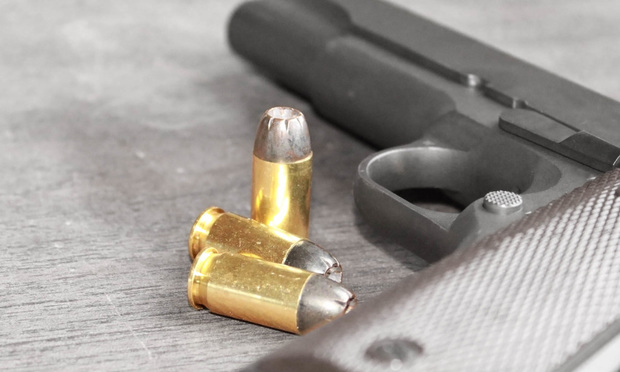Security Concerns on Rise for MDJ Courts in Wake of Southwest Pa. Shooting Incident
Most of those who spoke with The Legal said they were largely satisfied with the level of security that has been provided by the court and local governments, except for one piece of equipment that is missing—metal detectors.
September 24, 2018 at 05:30 PM
5 minute read
 Photo credit: Bigstock
Photo credit: Bigstock
Safety has always been a concern when it comes to court proceedings, but last week's shooting at a magisterial district judge's office in southwest Pennsylvania has raised new alarm bells for some judges across the state.
“There's something about that random level of violence, using the court system,” York County MDJ Ronald Haskell said. “You've heard of breaking through the glass ceiling. This is breaking through the glass floor. We've sunk to a new level.”
On Sept. 19, 62-year-old Patrick S. Dowdell, of Masontown, Pennsylvania, opened fire outside the Fayette County courthouse of Magisterial District Judge Daniel Shimshock, injuring four people before being fatally shot by police, according to several media outlets, including TribLive and the Observer-Reporter. Dowdell, according to reports, had a protection from abuse order against him, which had been filed by his wife, after he had allegedly been violent and threatening. Dowdell had been set to appear before Shimshock on charges of strangulation and domestic violence, the reports said.
Uniontown, Pennsylvania, attorney David Kaiser, who focuses on criminal defense, said he had been outside the office when the shooting began. Kaiser had been at the building to handle multiple cases as an assistant public defender. Although Kaiser declined to talk in detail about the shooting, he said the incident underscores the need for increased security.
“To say the least, you need the metal detectors,” Kaiser said. “We were lucky with the quick response. There were police officers there waiting for other hearings. Thank god.”
According to those who spoke with The Legal, district court offices are typically equipped with security cameras, panic buttons for judges and staff, bulletproof glass in the lobby area and locked courtrooms that require permission from staff to enter. Some district court offices also have metal-detecting wands that police officers can use. Some judges also bunch certain proceedings together so more police officials can be present during certain types of proceedings.
Most of those who spoke with The Legal said they were largely satisfied with the level of security that has been provided by the court and local governments, except for one piece of equipment that is missing—metal detectors.
The offices in Fayette County were not equipped with metal detectors, and none of those who spoke with The Legal said their officers are outfitted with the devices either.
The main sticking point is budgetary. More than the cost of purchasing the metal detectors, operating the devices would require trained personnel, and courts do not provide funding for personnel, court officials said. Courts can only purchase equipment, while county and state governments provide the funding for personnel.
Most court officials also said their offices undergo active shooter training.
“We continue to rehash that and go over and over that,” Somerset County District Court Administrator Brad Cober said. ”I'm sure [the shooting Sept. 19] made everybody's heart skip a beat, and we feel bad for what happened, and all employees at magisterial district judge offices are thinking twice about it.”
Cober and others said the shooting stresses the increased need for vigilance.
“The county has done what they can to keep us safe, and we need to do our part by being alert,” Bucks County MDJ Jan Vislosky said.
Vislosky said that, as a judge, her security concerns also extend outside the courtroom. She said she always parks under lights, and is on the lookout for suspicious packages, or skittish people. Her worries are heightened, she said, when she has to go door-to-door during election season to collect enough petitions to run for office.
“You don't know when you're going to cross paths with someone who's unhappy with a decision you made,” she said.
Along with the generalized active shooter training, Vislosky said that, in the weeks before the Fayette shooting, she reached out to local law enforcement to help develop a site-specific plan, so SWAT teams could know where all the windows, doors and hiding places might be in the event of a shooting or hostage situation.
“I think generally, people have gotten more aggressive, less patient and less respectful. That's a bad combination, and if you add in personal feelings, or drugs or alcohol interfering with your common sense, you could have a ticking time bomb,” she said.
Haskell said that, in the wake of the Fayette County shooting, he has changed some of his habits in an effort to be more vigilant.
“Today, before I came in, I looked up a list of the hearings and their types just to be a little more mindful of what's going on, and I saw that this afternoon there's a case involving an allegation of child sex abuse,” he said. “That's a case that's ripe for someone to be acting out.”
Haskell said he was hopeful the state might prioritize increasing personnel funding so, at least on days where criminal, or domestic abuse cases are being heard, more security officers could be at the courts.
“I think the legislature has got to provide a smorgasbord of options so the counties can figure out what works well for their in their particular county,” Haskell said, adding that, with rising concerns over safety, it is likely this additional infrastructure will be necessary within 10 to 15 years anyways. “It's the future. Let's do it before it's tragedy-driven.”
This content has been archived. It is available through our partners, LexisNexis® and Bloomberg Law.
To view this content, please continue to their sites.
Not a Lexis Subscriber?
Subscribe Now
Not a Bloomberg Law Subscriber?
Subscribe Now
NOT FOR REPRINT
© 2025 ALM Global, LLC, All Rights Reserved. Request academic re-use from www.copyright.com. All other uses, submit a request to [email protected]. For more information visit Asset & Logo Licensing.
You Might Like
View All

Pennsylvania Law Schools Are Seeing Double-Digit Boosts in 2025 Applications
5 minute read
Pa. Defense Firm Sued by Client Over Ex-Eagles Player's $43.5M Med Mal Win
3 minute read
Am Law 100 Lateral Partner Hiring Rose in 2024: Report
Trending Stories
- 1Uber Files RICO Suit Against Plaintiff-Side Firms Alleging Fraudulent Injury Claims
- 2The Law Firm Disrupted: Scrutinizing the Elephant More Than the Mouse
- 3Inherent Diminished Value Damages Unavailable to 3rd-Party Claimants, Court Says
- 4Pa. Defense Firm Sued by Client Over Ex-Eagles Player's $43.5M Med Mal Win
- 5Losses Mount at Morris Manning, but Departing Ex-Chair Stays Bullish About His Old Firm's Future
Who Got The Work
J. Brugh Lower of Gibbons has entered an appearance for industrial equipment supplier Devco Corporation in a pending trademark infringement lawsuit. The suit, accusing the defendant of selling knock-off Graco products, was filed Dec. 18 in New Jersey District Court by Rivkin Radler on behalf of Graco Inc. and Graco Minnesota. The case, assigned to U.S. District Judge Zahid N. Quraishi, is 3:24-cv-11294, Graco Inc. et al v. Devco Corporation.
Who Got The Work
Rebecca Maller-Stein and Kent A. Yalowitz of Arnold & Porter Kaye Scholer have entered their appearances for Hanaco Venture Capital and its executives, Lior Prosor and David Frankel, in a pending securities lawsuit. The action, filed on Dec. 24 in New York Southern District Court by Zell, Aron & Co. on behalf of Goldeneye Advisors, accuses the defendants of negligently and fraudulently managing the plaintiff's $1 million investment. The case, assigned to U.S. District Judge Vernon S. Broderick, is 1:24-cv-09918, Goldeneye Advisors, LLC v. Hanaco Venture Capital, Ltd. et al.
Who Got The Work
Attorneys from A&O Shearman has stepped in as defense counsel for Toronto-Dominion Bank and other defendants in a pending securities class action. The suit, filed Dec. 11 in New York Southern District Court by Bleichmar Fonti & Auld, accuses the defendants of concealing the bank's 'pervasive' deficiencies in regards to its compliance with the Bank Secrecy Act and the quality of its anti-money laundering controls. The case, assigned to U.S. District Judge Arun Subramanian, is 1:24-cv-09445, Gonzalez v. The Toronto-Dominion Bank et al.
Who Got The Work
Crown Castle International, a Pennsylvania company providing shared communications infrastructure, has turned to Luke D. Wolf of Gordon Rees Scully Mansukhani to fend off a pending breach-of-contract lawsuit. The court action, filed Nov. 25 in Michigan Eastern District Court by Hooper Hathaway PC on behalf of The Town Residences LLC, accuses Crown Castle of failing to transfer approximately $30,000 in utility payments from T-Mobile in breach of a roof-top lease and assignment agreement. The case, assigned to U.S. District Judge Susan K. Declercq, is 2:24-cv-13131, The Town Residences LLC v. T-Mobile US, Inc. et al.
Who Got The Work
Wilfred P. Coronato and Daniel M. Schwartz of McCarter & English have stepped in as defense counsel to Electrolux Home Products Inc. in a pending product liability lawsuit. The court action, filed Nov. 26 in New York Eastern District Court by Poulos Lopiccolo PC and Nagel Rice LLP on behalf of David Stern, alleges that the defendant's refrigerators’ drawers and shelving repeatedly break and fall apart within months after purchase. The case, assigned to U.S. District Judge Joan M. Azrack, is 2:24-cv-08204, Stern v. Electrolux Home Products, Inc.
Featured Firms
Law Offices of Gary Martin Hays & Associates, P.C.
(470) 294-1674
Law Offices of Mark E. Salomone
(857) 444-6468
Smith & Hassler
(713) 739-1250





